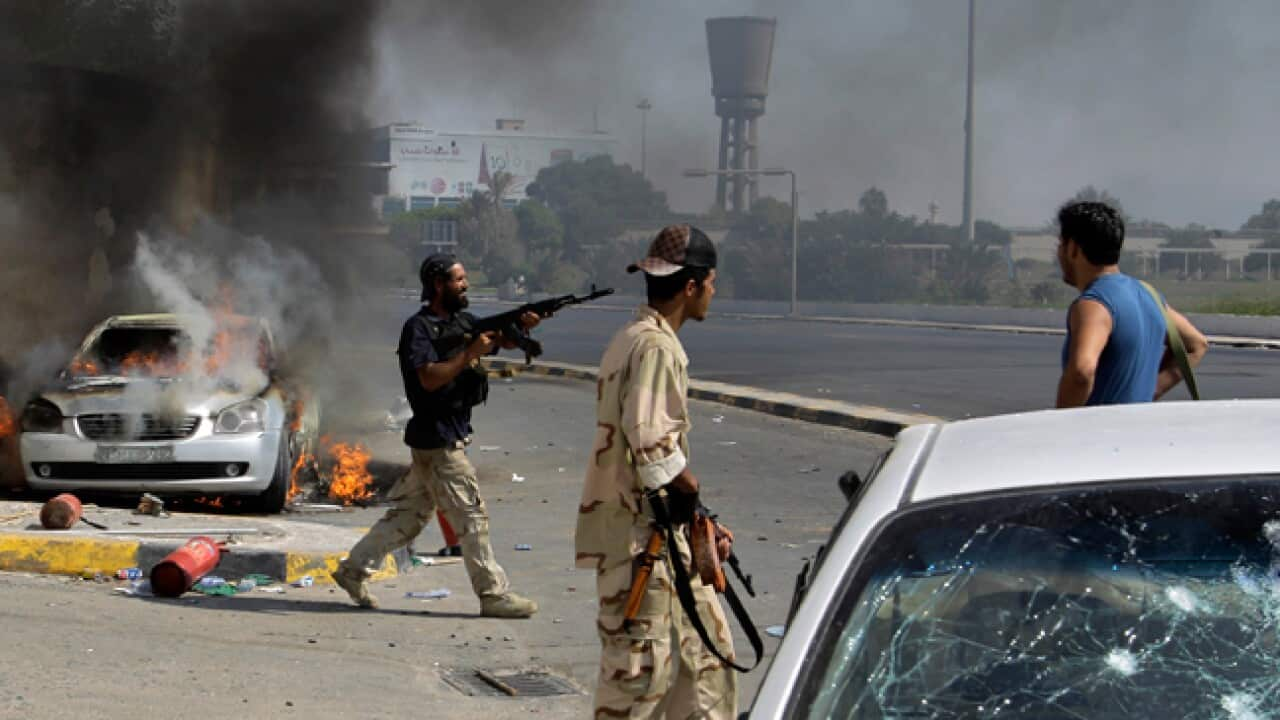A gunfight erupted in Tripoli on Tuesday, killing four in clashes between militias who helped topple Moammar Gaddafi's regime, as Libyan rulers appointed an ex-colonel as chief of the new army, whose job will be to control these fighters.
A group of men from Libya's third-biggest city Misrata traded anti-aircraft and heavy machinegun fire with a militia from a central Tripoli neighbourhood in broad daylight, witnesses and militia commanders said.
The fighting raised fresh concerns over the issue of militias in Tripoli and the potential security threat they pose months after Gaddafi's ouster.
"There's been some continued fighting -- we are concerned about that," US State Department spokeswoman Victoria Nuland told reporters.
"We have long supported the plans of the central authorities in Tripoli to create a central security force," she said. "So we obviously support the government's efforts to continue to do that.
HUNDREDS OF REBELS PRESENT
The gunfight broke out between Al-Zawiyah and Al-Saidi streets near a building used as intelligence headquarters by the former regime.
AFP reporters saw the entire neighbourhood surrounded by hundreds of former rebels amid bursts of gunfire.
"Four thwars (revolutionaries) were killed in the incident and five or six were injured," Abdelhakim Belhaj, the head of the Tripoli military council, told reporters.
"I regret the incident. I don't want to go into details but it was the result of a problem between Misrata thwars and members of the military council of Zawiyah street," Belhaj said.
"What happened is an irresponsible act and the situation is now under control. Since afternoon we did not hear any gunshots," he added.
Some witnesses told AFP reporters that the Misrata fighters had arrived in the neighbourhood to free one of their comrades detained by the neighbourhood militia.
The head of the security committee in the interior ministry, Colonel Mustafa Noah, told the official WAL news agency his ministry's forces were surrounding the neighbourhood and "the situation was under control."
He said "the clashes occurred between former thwars (revolutionaries) of Al-Zawiya street and thwars from outside Tripoli," adding a probe had been launched into the clashes.
Ex-rebels, who remain organised in militia brigades, are visible in many parts of Tripoli, and some have taken control of former government buildings to use as bases.
CLASHES DOWNPLAYED
Fathi Ali Bashagha, spokesman of the Misrata military council, played down the clashes.
"Such incidents are expected as there are so many arms in the city," Bashagha told AFP.
"It is the fault of the government. There is no authority and the government has lost more than one month of time. It has done nothing" in resolving the security issues, he added.
The militias, several of them from outside Tripoli, helped liberate the capital from Gaddafi's forces in August. Since then, they have stayed put in the city and refused to return to their home towns.
In the absence of regular security forces, the militias provide a semblance of order on the streets, but often clash between themselves.
As a step in that direction, Libya's rulers appointed an ex-colonel to head the new national army whose job, in part, will be to bring these militias under control and help integrate them into security forces.
Yussef al-Mangush, who took voluntary retirement from Gaddafi's military the late 1990s and is currently a deputy defence minister was promoted to the rank of general and appointed as chief of staff of the new army, Abdelrazzak al-Aradi, a member of the National Transitional Council told AFP.
"His appointment as the head of the army has been backed by NTC chief Mustafa Abdel Jalil and Prime Minister (Abdel Rahim) al-Kib," said another NTC member, Fathi al-Baaja.
During the anti-Gaddafi conflict, Mangush fought along with the rebels and was arrested in the oil town of Brega in April by Gaddafi forces. He was freed in late August following the fall of Tripoli.
Several officers of the former army had criticised the NTC for moving slowly on the appointment of the new chief of staff, saying the delay had held back the formation of a new army and the integration of former rebels who fought Gaddafi.
Tripoli residents have been protesting against the presence of militias from outside the capital, saying it has actually raised security concerns.

